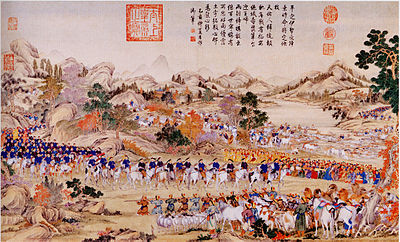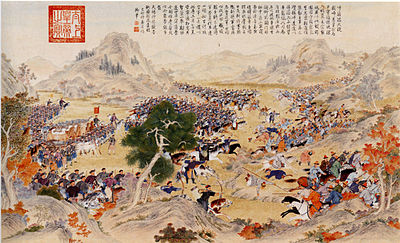Ten Great Campaigns
| First Campaign against the Dzungars | |||||||
|---|---|---|---|---|---|---|---|
 Surrender of Dawachi Khan in 1755 |
|||||||
|
|||||||
| Belligerents | |||||||
| Qing dynasty | Dzungar Khanate | ||||||
| Commanders and leaders | |||||||
|
Qianlong Emperor Bandi (Overall Command) Zhaohui (Assistant Commander) Emin Khoja Amursana Burhān al-Dīn Khwāja-i Jahān |
Dawachi (POW) | ||||||
| Strength | |||||||
| 9,000 Manchu Eight Bannermen 19,500 Inner Mongols 6,500 Outer Mongols 2,000 Zunghars 5,000 Uyghurs from Hami and Turfan 12,000 Chinese |
7,000 | ||||||
| Casualties and losses | |||||||
| Unknown | Unknown | ||||||
| Second Campaign against the Dzungars | |||||||
|---|---|---|---|---|---|---|---|
 The Battle of Oroi-Jalatu in 1758, Zhao Hui ambushes Amursana at night. |
|||||||
|
|||||||
| Belligerents | |||||||
| Qing dynasty | Dzungars loyal to Amursana | ||||||
| Commanders and leaders | |||||||
|
Qianlong Emperor Bandi †(1757) (Overall Command until death in battle) Cäbdan-jab (Overall Command) Zhaohui (Assistant Commander) Ayushi Emin Khoja Burhān al-Dīn Khwāja-i Jahān |
Amursana Chingünjav † |
||||||
| Strength | |||||||
| 10,000 Bannermen 5,000 Uyghurs from Turfan and Hami Plus Zunghars |
20,000 Dzungars | ||||||
| Casualties and losses | |||||||
| Unknown | everyone defeated except for 50 men of Chingünjav who fled | ||||||
| Campaign in Altishahr (Pacification of Xinjiang) | |||||||
|---|---|---|---|---|---|---|---|
 The Battle of Qurman 1759, Fude and Machang bring 600 troops to relieve Zhaohui in the Black River. |
|||||||
|
|||||||
| Belligerents | |||||||
| Qing dynasty |
Altishahri followers of the Khoja brothers Kyrgyzs Dzungar rebels |
||||||
| Commanders and leaders | |||||||
|
Qianlong Emperor Zhaohui (Overall Command) Fude (Assistant Commander) Agui Doubin Rongbao Zhanyinbao Fulu Shuhede Mingrui Arigun Machang Namjil † Yan Xiangshi Yisamu Duanjibu Khoja Emin Khoja Si Bek Sultan Shah of Badakhshan |
Khwāja-i Jahān POW Burhān al-Dīn POW |
||||||
| Strength | |||||||
| 10,000 Bannermen Uyghurs from Hami, Turfan and Badakshan Plus Zunghars |
30,000 Altishahr (Tarim Basin) Uyghurs | ||||||
| Casualties and losses | |||||||
| Unknown | Unknown | ||||||
| First Campaign against Jinchuan | |||||||
|---|---|---|---|---|---|---|---|
 Depiction of Qing troops on a campaign in Jinchuan ("Gold Stream") |
|||||||
|
|||||||
| Belligerents | |||||||
| Qing Empire | Jinchuan tribes | ||||||
| Commanders and leaders | |||||||
|
Qianlong Emperor Zhang Guangsi (Overall Command) (Executed by Qianlong) Naqin (Assistant Commander) (Executed by Qianlong) Fuheng (Overall Command) Zhaohui (Assistant Commander) |
Slob Dpon Tshe Dbang |
||||||
| Strength | |||||||
| Unknown | Unknown | ||||||
| Casualties and losses | |||||||
| Unknown | Unknown | ||||||
| Second Campaign against Jinchuan | |||||||
|---|---|---|---|---|---|---|---|
 Qing general Fuk'anggan assaults Luobowa mountain tower |
|||||||
|
|||||||
| Belligerents | |||||||
| Qing Empire | Jinchuan tribes | ||||||
| Commanders and leaders | |||||||
|
Qianlong Emperor Agui (Overall Command) Fuk'anggan (Assistant Commander) Fude (Executed by Qianlong in 1776) Wenfu † |
Sonom Senggesang |
||||||
| Strength | |||||||
| 8,000 | Unknown | ||||||
| Casualties and losses | |||||||
| Unknown | Unknown | ||||||
The Ten Great Campaigns (Chinese: 十全武功; pinyin: shí quán wǔ gōng) were a series of military campaigns launched by the Qing Empire of China in the mid–late 18th century during the reign of the Qianlong Emperor (r. 1735–96). They included three to enlarge the area of Qing control in Central Asia: two against the Dzungars (1755–57) and the pacification of Xinjiang (1758–59). The other seven campaigns were more in the nature of police actions on frontiers already established: two wars to suppress Jinchuan rebels in Sichuan, another to suppress rebels in Taiwan (1787–88), and four expeditions abroad against the Burmese (1765–69), the Vietnamese (1788–89), and the Gurkhas in Nepal on the border between Tibet and India (1790–92), with the last counting as two.
Of the ten campaigns, the final destruction of the Dzungars (or Zunghars) was the most significant. The 1755 Pacification of Dzungaria and the later suppression of the Revolt of the Altishahr Khojas secured the northern and western boundaries of Xinjiang, eliminated rivalry for control over the Dalai Lama in Tibet, and thereby eliminated any rival influence in Mongolia. It also led to the pacification of the Islamicised, Turkic-speaking southern half of Xinjiang immediately thereafter.
In 1752, Dawachi and the Khoit-Oirat prince Amursana competed for the title of Khan of the Dzungars. Dawachi defeated Amursana various times and gave him no chance to recover. Amursana was thus forced to flee with his small army to the Qing imperial court. The Qianlong Emperor pledged to support Amursana since Amursana accepted Qing authority; among those who supported Amursana and the Chinese were the Khoja brothers Burhān al-Dīn and Khwāja-i Jahān. In 1755, Qianlong sent the Manchu general Zhaohui, who was aided by Amursana, Burhān al-Dīn and Khwāja-i Jahān, to lead a campaign against the Dzungars. After several skirmishes and small scale battles along the Ili River, the Qing army led by Zhaohui approached Ili (Gulja) and forced Dawachi to surrender. Qianlong appointed Amursana as the Khan of Khoit and one of four equal khans – much to the displeasure of Amursana, who wanted to be the Khan of the Dzungars.
...
Wikipedia
